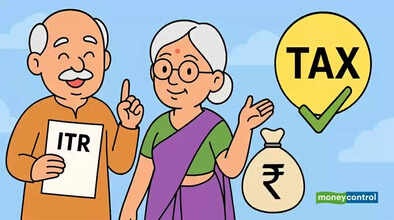These senior citizens do not need to file ITR, know if you are also exempted

ITR Filing 2025: Senior Citizens Above 75 Years Exempted from Filing Returns – Check Eligibility and Conditions
In a major relief for elderly taxpayers, the government has announced that certain senior citizens will no longer be required to file Income Tax Returns (ITR) for the financial year 2024-25. This exemption aims to ease compliance for individuals who are fully dependent on pension income and interest earned from the same bank. However, the benefit comes with specific conditions and is not applicable to all retirees.
Who Can Avail the Exemption?
As per the Income Tax Act, resident senior citizens aged 75 years or above are eligible for this exemption. But there is a catch – the relief is available only if the individual’s income is limited to pension and interest from the same bank in which the pension is credited.
If the person earns income from other sources – for example, rent, business, capital gains, or even interest from another bank – then filing ITR remains mandatory.
Conditions Based on Pension and Interest Income
The government has clearly outlined that:
-
The primary source of income must be pension.
-
Any interest income must come only from the same bank account where the pension is deposited.
This condition has been added to ensure simplicity and transparency in calculating tax liability without requiring multiple sources of income declaration.
Declaration to the Bank Is Mandatory
Senior citizens who wish to claim this exemption must submit a declaration form to their respective bank. This form should include details of their income and the eligible tax deductions.
Once submitted, the bank will take over the responsibility of:
-
Calculating the tax liability
-
Deducting TDS (Tax Deducted at Source) on behalf of the individual
This means that banks will directly manage tax compliance, sparing senior citizens the hassle of filing an ITR.
Banks Authorized by the Government
It is important to note that not every bank can perform this function. Only those banks notified by the Central Government are authorized to handle these declarations and manage TDS deductions.
While deducting tax, banks must also consider all eligible benefits under Section VI-A (deductions such as 80C, 80D, etc.) and Section 87A (rebate). This ensures that the taxpayer is not deprived of deductions and rebates otherwise available while filing an ITR.
Senior Citizen vs. Super Senior Citizen
The Income Tax Act distinguishes between categories of elderly taxpayers:
-
Senior Citizens: Individuals aged between 60 and 79 years
-
Super Senior Citizens: Individuals aged 80 years or above
However, the exemption under Section 194P is specifically applicable only to those who are 75 years and above. This means not all seniors get this benefit – only those crossing the 75-year threshold and fulfilling the prescribed conditions.
Why This Change Matters
Filing income tax returns often becomes a complex and stressful task for elderly citizens. The government’s decision under Section 194P ensures that those who have simple sources of income (pension and bank interest) can live without the added burden of paperwork and digital filing.
This step is expected to benefit lakhs of senior citizens across the country. It reduces compliance requirements, saves time, and provides peace of mind to elderly taxpayers who often struggle with online ITR filing procedures.
Key Takeaways
-
Senior citizens aged 75 years or more may be exempt from filing ITR.
-
Applicable only if the income comes solely from pension and interest from the same bank.
-
A declaration form must be submitted to the bank, which will then handle tax calculations and TDS.
-
Only government-notified banks are authorized to manage this process.
-
Exemption applies under Section 194P, exclusively for individuals aged 75+.
This exemption is a welcome move by the government, designed to ease the financial and administrative stress on India’s elderly population. Senior citizens meeting the eligibility criteria can now focus on enjoying their retirement years without worrying about annual tax filing.

